英语一般过去时,将来时,现在时的讲解和应用操练
一般现在时,一般过去时,一般将来时,过去将来时

一、一般现在时的用法1)经常性或习惯性的动作,常与表示频度的时间状语连用。
时间状语:often,usually,always,sometimes,every week(day,year,month...),once a week,on Sundays,etc.例如:I leave home for school at 7 every morning. 每天早上我七点离开家。
2)客观真理,客观存在,科学事实。
例如:The earth moves around the sun. 地球绕太阳转动。
Shanghai lies in the east of China. 上海位于中国东部。
3)表示格言或警句。
例如:Pride goes before a fall. 骄者必败。
注意:此用法如果出现在宾语从句中,即使主句是过去时,从句谓语也要用一般现在时。
例如:Columbus proved that the earth is round. 哥伦布证实了地球是圆的。
4)表示主语的特征、性格、能力、爱好等。
例如:He can swim.I work hard.I like watching TV.二、一般过去时的用法1)在确定的过去时间里所发生的动作或存在的状态。
时间状语有:ago,yesterday,the day before yesterday,last week(year,night,month...),in 1989,just now,at the age of 5,one day,long long ago,once upon a time,etc.例如:Where did you go just now 刚才你上哪儿去了2)表示在过去一段时间内,经常性或习惯性的动作。
When I was a child, I often played football in the street.我是个孩子的时候,常在马路上踢足球。
英语时态8种基本时态讲解.ppt课件

8.过去完成时 表示动作发生在过去某一时间之前已经完成的动作或状态, 强调“过去的过去”, 常与 by the time, by the end of…,before , by 等引导时间的状语连用。
基本结构 主语+ had + 动词过去分词 + 其他成分 When I got to the cinema yesterday the film had begun already. He had learned English before he came here.
现在完成时与一般过去时的区别: 1)现在完成时侧重于对现在的影响;而一般过去时侧重于某一动作发生在过去某个时间或某段时间。即现在完成时侧重于现在的结果,而一般过去时侧重于动作发生的时间。例如:
I have seen the film. 我看过这部电影。(现在我仍记得电影的内容) I saw the film three days ago. 三天前我看了这部电影。(强调是三天前,而不是别的什么时候看的电影)
be going to含有“打算,准备”的意思,而will则没有这个意思, She is going to lend us her book. He will be here in half an hour.
be about to+V.原形(意为马上做某事,在时间上指最近的将来) I am about to leave school. 不能与表示时间的副词连用。 They are about to set out.(√) They are about to set,变y为i加-ed. study----studied carry----carried cry----cried try----tried d)以元音字母+y结尾的单词直接加-ed. play----played stay----stayed
英语时态总结(现在、过去、将来)
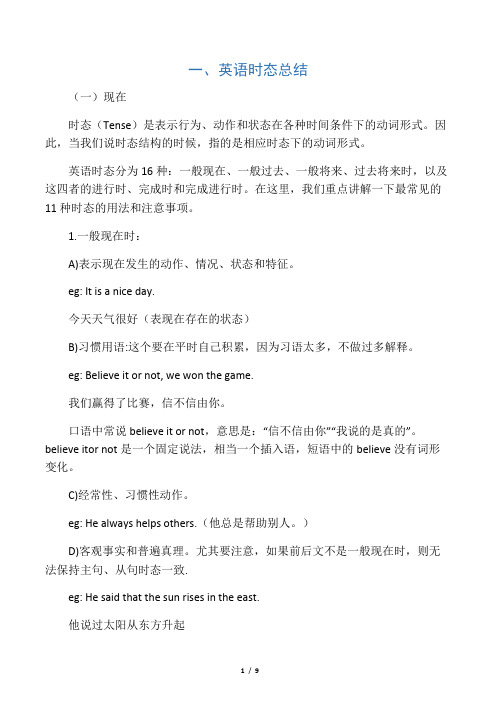
一、英语时态总结(一)现在时态(Tense)是表示行为、动作和状态在各种时间条件下的动词形式。
因此,当我们说时态结构的时候,指的是相应时态下的动词形式。
英语时态分为16种:一般现在、一般过去、一般将来、过去将来时,以及这四者的进行时、完成时和完成进行时。
在这里,我们重点讲解一下最常见的11种时态的用法和注意事项。
1.一般现在时:A)表示现在发生的动作、情况、状态和特征。
eg: It is a nice day.今天天气很好(表现在存在的状态)B)习惯用语:这个要在平时自己积累,因为习语太多,不做过多解释。
eg: Believe it or not, we won the game.我们赢得了比赛,信不信由你。
口语中常说believe it or not,意思是:“信不信由你”“我说的是真的”。
believe itor not是一个固定说法,相当一个插入语,短语中的believe没有词形变化。
C)经常性、习惯性动作。
eg: He always helps others.(他总是帮助别人。
)D)客观事实和普遍真理。
尤其要注意,如果前后文不是一般现在时,则无法保持主句、从句时态一致.eg: He said that the sun rises in the east.他说过太阳从东方升起这个句子要注意,前边虽然said是过去式,但是后边“太阳从东方升起”是个客观真理,故不需同前边一样用过去式,而用一般现在时。
总而言之,记住:客观事实无论谓语的时态是什么都用一般现在时。
E)表示一个按规定、计划或安排要发生的动作,(仅限于某些表示“来、去、动、停、开始、结束、继续”等的动词)可以与表示未来时间的状语搭配使用。
常见的用法是:飞机、火车、轮船、汽车等定期定点运行的交通方式。
eg: When does the plane leave?飞机什么时候起飞eg:The plane leaves at 3 o’clock this afternoon.飞机将在今下午三点起飞这个句子注意一下,飞机起飞本来是将来时,但为什么不用将来时,因为这里表示一个按规定、计划或安排要发生的动作,飞机起飞时间是规定、计划好了的。
小升初语法辨析一般现在时一般过去时一般将来时(讲义)人教PEP版英语六年级下册

小升初英语语法辨析:一般现在时、一般过去时、一般将来时&专项模拟练习一、一般现在时1.定义:表示经常发生的动作、存在的状态或普遍真理。
2.时间标志词:often(经常)、usually(通常)、always(总是)、sometimes(有时)、every day/week/month/year(每天/ 周/ 月/ 年)等。
3.结构:1.主语(非第三人称单数)+ 动词原形。
例如:You play basketball afterschool.(你放学后打篮球。
)2.主语(第三人称单数)+ 动词的第三人称单数形式。
例如:He playsbasketball after school.(他放学后打篮球。
)4.用法:1.表示经常性或习惯性的动作。
如:I go to school by bike every day.(我每天骑自行车去上学。
)2.表示现在的状态或特征。
如:She is tall and thin.(她又高又瘦。
)3.表示客观事实或普遍真理。
如:The earth moves around the sun.(地球绕着太阳转。
)二、一般过去时1.定义:表示过去某个时间发生的动作或存在的状态。
2.时间标志词:yesterday(昨天)、last week/month/year(上周/ 上个月/ 去年)、ago(……以前)、in + 过去的年份等。
3.结构:主语+ 动词的过去式。
例如:You played basketball yesterday.(你昨天打了篮球。
)4.用法:1.表示过去某个时间发生的动作。
如:I went to the park last Sunday.(我上周日去了公园。
)2.表示过去存在的状态。
如:He was happy yesterday.(他昨天很开心。
)三、一般将来时1.定义:表示将来某个时间要发生的动作或存在的状态。
2.时间标志词:tomorrow(明天)、next week/month/year(下周/ 下个月/ 明年)、in the future(在未来)等。
动词时态的全面解析准确运用过去现在和将来时

动词时态的全面解析准确运用过去现在和将来时动词时态的全面解析及准确运用过去、现在和将来时动词时态是英语语法中的一个重要部分,它用来表达动作或状态发生的时间。
正确地运用时态可以使句子更加准确、流畅,并能够有效传达我们所要表达的意思。
本文将对动词时态进行全面解析,并指导如何准确运用过去时、现在时和将来时。
1. 过去时(Past Tense)过去时用于描述已经发生过的动作或状态。
一般过去时表示的是过去某个特定时间发生的动作,例如:I watched a movie last night.(昨晚我看了一部电影。
)He lived in London for five years.(他在伦敦生活了五年。
)除了一般过去时外,过去时还有以下几种形式:1.1 过去进行时(Past Continuous Tense)过去进行时表示过去某一时间正在进行的动作,或过去某一时间段内连续发生的动作,例如:I was watching a movie when she called me.(她给我打电话时,我正在看电影。
)They were playing basketball from 4 pm to 6 pm yesterday.(昨天从下午4点到6点,他们一直在打篮球。
)1.2 过去完成时(Past Perfect Tense)过去完成时表示在过去某个时间之前已经发生的动作,例如:She had already finished her homework before he arrived.(他到之前她已经完成了作业。
)They had known each other for ten years before they got married.(他们在结婚前已经认识了十年。
)1.3 过去完成进行时(Past Perfect Continuous Tense)过去完成进行时表示过去某一时间之前一直在进行的动作,例如:I had been waiting for two hours when the bus finally arrived.(公交车最终到达时,我已经等了两个小时了。
高中英语最实用语法一般过去时、现在完成时、将来完成时讲解和经典习题
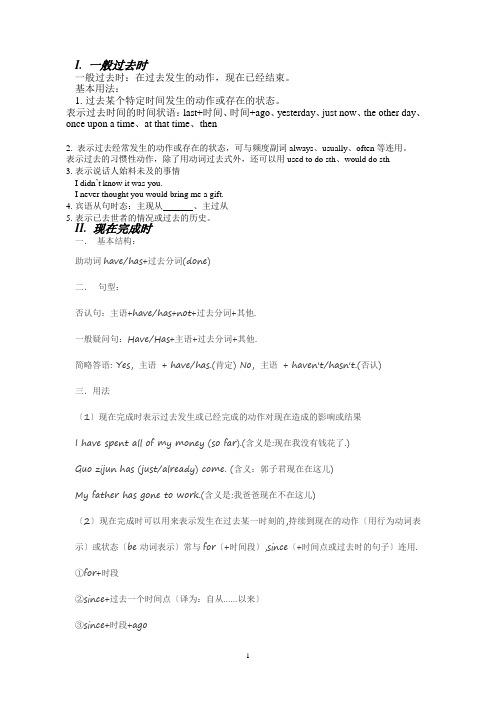
I. 一般过去时一般过去时:在过去发生的动作,现在已经结束。
基本用法:1.过去某个特定时间发生的动作或存在的状态。
表示过去时间的时间状语:last+时间、时间+ago、yesterday、just now、the other day、once upon a time、at that time、then2. 表示过去经常发生的动作或存在的状态,可与频度副词always、usually、often等连用。
表示过去的习惯性动作,除了用动词过去式外,还可以用used to do sth、would do sth3.表示说话人始料未及的事情I didn’t know it was you.I never thought you would bring me a gift.4.宾语从句时态:主现从、主过从5.表示已去世者的情况或过去的历史。
II. 现在完成时一.基本结构:助动词have/has+过去分词(done)二.句型:否认句:主语+have/has+not+过去分词+其他.一般疑问句:Have/Has+主语+过去分词+其他.简略答语: Yes, 主语+ have/has.(肯定) No, 主语+ haven't/hasn't.(否认)三.用法〔1〕现在完成时表示过去发生或已经完成的动作对现在造成的影响或结果I have spent all of my money (so far).(含义是:现在我没有钱花了.)Guo zijun has (just/already) come. (含义:郭子君现在在这儿)My father has gone to work.(含义是:我爸爸现在不在这儿)〔2〕现在完成时可以用来表示发生在过去某一时刻的,持续到现在的动作〔用行为动词表示〕或状态〔be动词表示〕常与for〔+时间段〕,since〔+时间点或过去时的句子〕连用.①for+时段②since+过去一个时间点〔译为:自从……以来〕③since+时段+ago④主句〔现在完成时〕since+从句〔一般过去时〕→主完从过●⑤It is/ has been +时段+since+从句〔过去时〕Mary has been ill for three days.I have lived here since 1998.⑥It is + 第几次〔the first time〕that + 句子〔现在完成时〕四. has gone (to),has been (to), has been (in) 的区别Have/Has gone(to) :去了(现在不在说话现场)Where is your father?He has gone to Shanghai.Have/Has been (to) :去过〔已不在去过的地方〕My father has been to Shanghai.Have/has been in:呆了多久〔还在所呆的地方〕My father has been in Shanghai for two months. /since two months ago. 五.现在完成时的标志1. 现在完成时的含义之一是过去完成的动作对现在仍有影响,用以下四大标志词可以表达这种含义:* 以already, just和yet为标志He has already got her help. 他已得到她的帮助。
初中英语语法一般现在时、将来时、过去时讲解及练习题
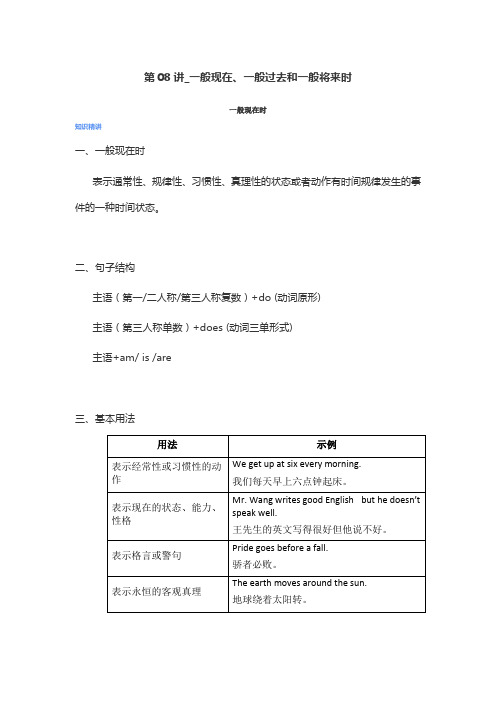
一般现在时知识精讲一、一般现在时表示通常性、规律性、习惯性、真理性的状态或者动作有时间规律发生的事件的一种时间状态。
二、句子结构主语(第一/二人称/第三人称复数)+do (动词原形)主语(第三人称单数)+does (动词三单形式)主语+am/ is /are三、基本用法四、时间状语1. 表示频率的副词: always, usually, often, sometimes, never, hardly, seldom…2. every/once+名词: every day/ week/ year, once a week/ month …3. 表示时间的短语: twice a day, on weekends, on Mondays…五、一般现在时动词三单的变化规律六、相关句式三点剖析一、考点:时态是英语学习中的核心内容之一,是英语学习的基础。
自然,时态考查是各种英语考试尤其是中考时的座上宾。
动作发生的时间决定时态,时态决定动词的形式,而考卷中的时态题通常没有给出明确的时间标志词,考试需领悟所提供的语境来做出判断。
只有推断出动作发出的正确时间,才可能正确答题,这就要求考生在熟练掌握时态结构、用法并牢记常用的时间状语的基础上,要充分利用上下文中隐含的信息来捕捉时间,找准答题的突破口。
二、重难点:一般现在时在考试中的重难点是:句子结构、基本用法、标志时间状语、动词三单的变化规则及相关句式的变化。
三、补充点:1. 表示按计划或安排好的,或将要发生的动作,可用一般现在时表将来。
但只限于start, begin, leave, go, come, arrive, return, take place等。
例:My train leaves at 7:00 this afternoon.我乘坐的火车将在今天下午7点离开。
2. 在复合句中,当主句是一般将来时,时间或条件状语从句的谓语动词只能用一般现在时来表示将来要发生的动作。
初中英语语法专项复习英语动词时态和语态讲解和练习题
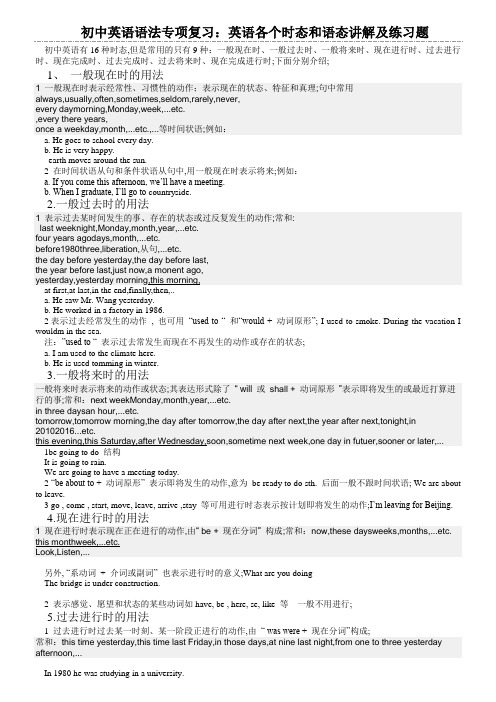
初中英语语法专项复习:英语各个时态和语态讲解及练习题初中英语有16种时态,但是常用的只有9种:一般现在时、一般过去时、一般将来时、现在进行时、过去进行时、现在完成时、过去完成时、过去将来时、现在完成进行时;下面分别介绍;1、一般现在时的用法1 一般现在时表示经常性、习惯性的动作;表示现在的状态、特征和真理;句中常用always,usually,often,sometimes,seldom,rarely,never,every daymorning,Monday,week,...etc.,every there years,once a weekday,month,...etc.,...等时间状语;例如:a. He goes to school every day.b. He is very happy.earth moves around the sun.2 在时间状语从句和条件状语从句中,用一般现在时表示将来;例如:a. If you come this afternoon, we’ll have a meeting.b. When I graduate, I’ll go to countryside.2.一般过去时的用法1 表示过去某时间发生的事、存在的状态或过反复发生的动作;常和:last weeknight,Monday,month,year,...etc.four years agodays,month,...etc.before1980three,liberation,从句,...etc.the day before yesterday,the day before last,the year before last,just now,a monent ago,yesterday,yesterday morning,this morning,at first,at last,in the end,finally,then,..a. He saw Mr. Wang yesterday.b. He worked in a factory in 1986.2表示过去经常发生的动作, 也可用“used to “ 和“would + 动词原形”; I used to smoke. During the vacation I wouldm in the sea.注:”used to “ 表示过去常发生而现在不再发生的动作或存在的状态;a. I am used to the climate here.b. He is used tomming in winter.3.一般将来时的用法一般将来时表示将来的动作或状态;其表达形式除了“ will 或shall + 动词原形”表示即将发生的或最近打算进行的事;常和:next weekMonday,month,year,...etc.in three daysan hour,...etc.tomorrow,tomorrow morning,the day after tomorrow,the day after next,the year after next,tonight,in 20102016...etc.this evening,this Saturday,after Wednesday,soon,sometime next week,one day in futuer,sooner or later,...1be going to do 结构It is going to rain.We are going to have a meeting today.2 “be about to + 动词原形” 表示即将发生的动作,意为be ready to do sth. 后面一般不跟时间状语; We are about to leave.3 go , come , start, move, leave, arrive ,stay 等可用进行时态表示按计划即将发生的动作;I’m leaving for Beijing.4.现在进行时的用法1 现在进行时表示现在正在进行的动作,由“ be + 现在分词” 构成;常和:now,these daysweeks,months,...etc. this monthweek,...etc.Look,Listen,...另外, “系动词+ 介词或副词” 也表示进行时的意义;What are you doingThe bridge is under construction.2 表示感觉、愿望和状态的某些动词如have, be , here, se, like 等一般不用进行;5.过去进行时的用法1 过去进行时过去某一时刻、某一阶段正进行的动作,由“ was were + 现在分词”构成;常和:this time yesterday,this time last Friday,in those days,at nine last night,from one to three yesterday afternoon,...In 1980 he was studying in a university.He was reading a novel when I came in.6.现在完成时的用法现在完成时由“have/has + 过去分词.其使用有两种情况:1 现在完成时所表示的动作在说话之前已完成,但对现在有影响;句中没有具体时间状语;常和:just,alreadly,yet,never,ever,now,before,this week,today,these days,once,twice,three times,...He has gone to Fuzhou.He has been to Fuzhou.2 现在完成时所表示的动作开始于过去,持续到现在,也许还会持续下去常用for 和since表示一段时间的状语或since then1949,last Monday,two o'clock,从句...,etc.,ever since then,for three daysa long time,two hours,...etc.so far , now, today, this wek month, year 等表示包括现在内的状语;He has studied English for 5 years.He has studied English since 1985.Now I have finished the work..注意:表示短暂时间动作的词如come, go , die, marry, buy 等的完成时不能与for, since 等表示一般时间的词连用;正确:I have bought the book already.错误:I have bought the book for two years.改:I have had the bookl for two years.7.过去完成时的用法1 过去完成时由“had + 过去分词”构成;过去完成时的动作表示过去某一时刻或某一时刻或某一动作之前完成的动作或状态;句中常用by then1977,yesterday,eight last night,the time we got there,...etc.by the end of last termweek,year,month,...etc..by, before, until, when 等词引导的时间状语;By the end of last year we had built five new houses.I had learnt 5000 words before I entered the university.2过去完成时的动词还可表示过去某一时刻之前发生的动作或状态持续到过去某个时间或持续下去;Before he slept, he had worked for 12 hours.8.过去将来时的用法过去将来时表示从过去的某个时间看来将要发生的动作或存在的状态;过去将来时由“should 或would + 动词原形” 构成;第一人称用should, 其他人称用would. ;常和:They were sure that they would succeed.二动词语态1.当句子的主语是动作的执行者时, 谓语的形式叫主动语态;句子的主语是动作承受者时,谓语的形式叫被动作语态;被动语态由助动词be + 过去分词构成,时态通过be 表现出来;1 一般现在时:You are required to do this.2 一般过去时:The story was told by her.3 一般将来时:The problem will be discussed tomorrow.4 现在进行时:The road is being widened.5 过去进行时:The new tool was being made.6 现在完成时:The novel has been read.7 过去完成时:He said that the work had been finished.8 过去将来时:He said that the trees would be planted soon.2. 一些特殊的被动结构1 带情态动词的被动结构:The problem must be solved soon.2 带不定式的被动结构:The room is going to be painted.The homework needs to be done with care.3 短语动词的被动:a.不及物动词+介词:若这类短语动词是及物性的,则可用于被动语态中,如:laugh at, look after, talk about, think of 等;若这类短语动词是不及物性的则不可用于被动语态中,如:book up, look down. 等b.及物动词+副词:bring about, carry out, find out, make out, put away, put off, take up, turn down, turn out, wipe out 等c. 动词+副词+介词:do away with, face up to, give into ,look down upon, make up with等d. 动词+名词+介词:catch sight of, keep on eye on, make a fool of , pay attention to , put an end to , set fire/light to , take notice of 等4 带复合宾语的动词在改为被动语态时,一般把主动结构中的宾语改为主语,宾语补足语保留在谓语后面;We always keep the classroom clean.比较:The classroom is always kept clean.5主动形式表示被动意义的词;常见的有:a.主动形式,这时动名词同句中的主语有动宾关系;The children need looking after.The windows wants /requires repairing.This point deserves mentioning.练习题1. It is a fine day. The sun __________shine brightly.2. They ___________visit the Science Museum next Sunday.3. Mr Brown________live in Beijing since he came to China.4. Mr Wang ________teach us English two years ago.5. The Smiths _______________ watch TV at this time last night.6. We __________learn about ten English songs by the end of last term.7. Father said that he ____________buy a new bike for me the next Friday.8. Bill isn¡¯t here. He ___________chat with his friends in the classroom.9. The teacher said that the moon __________go round the earth.10. The Young Pioneers will go to the zoo if it ____________not rain this Sunday.11. Listen They __________talk about the new film.12. Jim asked us what ___________happen in China in 1976.13. My mobile phone ___________steal on a bus last week.14. The host ____________interview the little boy just now.15. The Greens __________watch TV now.16. He said that he _____________ring me up when he got there.17. We ____________learn English for about three years.18. My brother_____________join the League in 1997.19. The farmers __________pick apples when I saw them.20. The red skirt __________cost the girl forty yuan.21. The film ____________begin when I got to the cinema.22. The girl told me that she wanted to be an English teacher when she _____grow up.23. My sister is a student and she _____________study at a middle school nearby.24. Mr Green __________travel to several places in South China since he came here.25. You _________catch the early bus if you get up early.26. _______you been________wear glasses all the time27. I’ll go home as soon as I _______finish my homework.29. Most science books are ______write in English.30. I ____________stay there for two months last year.31. Tell Lily to call me as soon as she _______.A. will arriveB. gets thereC. has goneD. reach here32. ----Hi, Kate. You look tired. What’s the matter ----I ______ well last night.A. didn’t sleepB. don’t sleepC. haven’t sleptD. won’t sleep33. ----Excuse me, look at the sign over there, please. Could you stop smoking----Sorry, I ____ that.A. didn’t seeB. don’t seeC. won’t seeD. can’t see34. ----Well, I found this. I think it must be yours. ----My watch Thank you. Where _____itA. do you findB. had you foundC. were you findingD. did you find35. ----Don you know when Dr White ____ for dinner this evening----No, but I think he ____ when he is free.A. will come; comesB. will come; will comeC. comes; comesD. comes; will come36. Look at those black clouds. It _____ rain. Let’s hurry. A. maybe B. would C. has D. is going to37. ----Jimmy is leaving for a holiday. ----Really Where ____ he ____A. has; goneB. will; goC. did; goD. does; go38. ----Shall we go shopping now ---Sorry, I can't. I ____ my shirts.A. washB. washesC. washedD. am washing39. ----I called you yesterday evening, but there was no answer.----Oh, I am sorry. I ___ dinner at my friend's home.A. haveB. hadC. was havingD. have had40. The Oriental Pearl TV Tower ____ thousands of visitors since 1995.A. attractedB. attractsC. has attractedD. will attract46. ----Why didn't you go to the cinema yesterday -----Because I ____ the film before.A. had seenB. have seenC. have watchedD. has watched47. I don't think John saw me. He ____ a book at that moment.A. just readB. has just readC. was just readingD. had just read48. Mr Smith ____ a book about China last year but I don't know whether he has finished it.A. has writtenB. wroteC. had writtenD. was writing49. Mr White ____ the newspaper while his daughter ____TV.A. has read; was watchingB. was reading; watchedC. was reading; was watchingD. reading; watched50. ---- I ____ you at the meeting. Why ----I was ill. A. saw B. have seen C. not see D. didn't see51. The 29th Olympic Games ____ in Beijing in 2008. A. hold B. will hold C. will be held D. held52. Hurry up The play ____ for ten minutes. A. has been on B. has begun C. had begun D. began53. ----May I speak to Mr Smith ----Sorry, he ____ Australia. But he ____ in two days.A. has been to; will come backB. has gone to; will be backC. has been in; would come backD. is leaving for; doesn't come back54. I can't go to the theater tonight because I ____ my ticket.A. have lostB. had lostC. will loseD. was losing55. ----What a nice bike How long ____ you ____ it ----Just two weeks.A. have; boughtB. did; buyC. have; hadD. are; having56. ----I'm sorry to have kept you waiting. ----Oh, not at all. I ____ here only for a few minutes.A. have comeB. had beenC. wasD. have been57. ----____ my dictionary anywhere ---- Yes. I saw it on your desk a moment ago.A. Did you seeB. If you seeC. Had you seenD. Would you see58. We were all surprised when he mad it clear that he ____ office soon.A. leavesB. would leaveC. will leaveD. had left答案:I. 1. shines/ is shining 2. are going to/ will visit 3. has lived 4. taught5. were watching6. had learned7. would buy8. is chatting9. goes 10.doesn't rain 11. are talking 12. happened 13. was stolen 14. interviewed15. are watching16. would ring 17. have learned 18. joined 19. were picking 20. cost21. had begun 22. grew 23. studies 24. has traveled 25. will catch26. Have; wearing 27. finish 28. haven't heard 29. written 30. stayedII. 31--35 BAADB 36--40 DBDCC 41--45 ACBAC 46--50 ACDCD51--55 CABAC 56--60 DABDA 61--65 BDBAB 66-70 BDABC 71--75 BCADD。
精讲初中五种时态一般现在时的,一般过去式,现在进行,现在完成时,一般将来时

•
ห้องสมุดไป่ตู้
3.按要求进行句型转换: 1. Look! Lily is dancing.(改为一般疑问句) _______________________________________________ _ 2. Kate is looking for her watch.(改为否定句) _______________________________________________ _ 3. Mrs White is watching TV.(对划线部分提问)
• 二、用所给单词的正确形式填空填空: • 1. My father always __________(come) back from work very late. • 2. The teacher is busy. He __________ (sleep) six hours a day. • 3. Listen! Joan __________(sing) in the classroom. She often __________ (sing) there. • 4. __________ your brother __________(know) Japanese? • 5. Where __________ you __________ (have) lunch every day? • • 6. The girl __________(like) wearing a skirt. Look! She __________(wear) a red skirt today. • 7. My parents _______(watch)TV now. 8. Look. Three boys _______(run). 9. What _______ your mother _______(do)now? 10. _______ your dog _______ now?(sleep) • 11. _______ you _______(listen)to music? Yes, I am. 12. Look, Miss Chen _______ (play)football. 13. Tom and his sister _______(wait)for you over there. 14. Now Class 3 and Class 4_______(have)a test. 15. Listen, someone _______(sing)in the classroom. 16. ——Where is Zhang Yan? ——She _______(talk)with her teacher in the teacher’s office.
16种英语时态讲解PPT课件
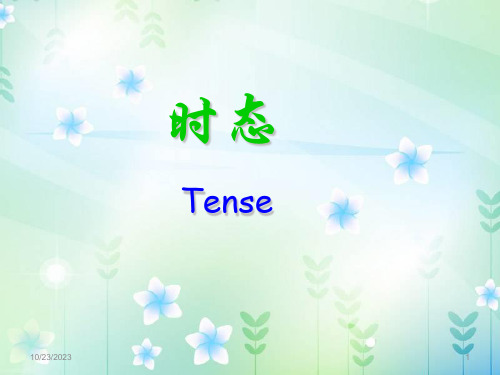
10/23/2023
8
五、现在进行时态
现在进行时的基本用法
形式: am/is/are + doing
用法1: 表示说话此刻动作正在进行.
• He is not available now. he is talking on the phone.
• Please don’t make so much noise. I am studying.
时态
Tense
10/23/2023
1
一、时态概述
16种时态 一般动作
现在 一般现在
过去 一般过去
进行动作 现在进行 过去进行
完成动作 现在完成 过去完成
完成进行动 现在完成
作
进行
过去完成 进行
将来 一般将来 将来进行 将来完成 将来完成
进行
过去将来 一般过去将来 过去将来进行 过去将来完成 过去将来完成
此用法常与一些表示动作频率的时间副词连用(副词放在be动词之 后, 实义动词之前).
1) 表示肯定的频率副词: always, frequently, usually, sometimes, often, occasionally, generally 等.
2) 表示否定的频率副词: never, seldom, rarely 等.
10/23/2023
6
四、一般将来时态
一般将来时的基本用法
形式:
will do 或be going to do
用法1: 表示预测将要发生某事,用will或be going to do.
1) be going to 特别意指根据目前的明显迹象来推断某件事 要发生; will 则只是表名说话人认为或相信某件事要发生
(完整版)小学一般现在时-过去式-现在进行时-将来时讲解

四种时态的比较.不规则动词过去式:原形过去式原形过去式原形过去式原形过去式sweep swept teach taught have had go went keep kept think thought do did find found sleep slept buy bought eat ate say said feel felt drink drank is/am was take took read read give gave are were mean meantput put sing sang drive drove meet met cut cut begin began speak spoke make made let let ring rang write wrote see saw fly flew run ran ride rode come came draw drew sit sat hear heard tell toldgrow grew learn learned/learntget got know knew一、用动词的适当形式填空1. My parents _______ (come) from Shandong.2. Sam _______(not like) playing computer games.3. The beautiful girl _______(wear) glasses.4. The Zhang family _______(live) in a flat in Nanjing.5. My father likes _______(read) newspapers after work.6. What _______her classmates _______(call) her teacher?7. _______ you _______(love) each other in your family?8. _______(be) your cousin very clever at maths?9. She is good at dancing. She ________ (sing) very well, too.11. Amy ________(take) her dog for a walk every afternoon.12. Mr. Li ________(not teach) us maths this term. (学期)13. Mr. Chen ________(not like) tea. He ________(enjoy) drinking coffee.14. ________ your father often ________(play) tennis ?No, he loves ________(read) newspapers.15. Everyone in our class ________(like) P.E. a lot.16. Who else ________(want) to come to Millie’s party? I ________.17. Many of them ________(work) hard at their lessons. They _____ (be) cl ever at them.18. What _______ Mary _______(have) for breakfast ?She _______(have) an egg and a glass of milk.19. Our school ________(be) a big nice school. And our teacher ______(be ) a good teacher.20. Simon and Daniel ________(be) American.二、句型转换。
一般过去时现在进行时一般现在时一般将来时的用法

一般过去时的用法一、概念1.表示在的过去某个时间里所发生的动作或存在的状态。
时间状语有:yesterday, last week, an hour ago, in 1982等。
如:1)I was at the zoo yesterday. 昨天我在动物园。
2)I went to bed at eleven last nigth. 昨晚我11:00睡觉。
2.表示在过去一段时间内,经常性或习惯性的动作。
1)When I was a child, I often played football in the street.我在小的时候,我经常在街道上踢足球。
2)My father often drove to work last year. 去年,我爸爸经常开车上班。
二、句子结构1.在表示某个时间里存在的状态的句子,系动词用过式was,were构成。
如:(1)I was at home yesterday.昨天我在家。
(2)We were in the gym just now. 刚才我们在体育馆。
2.在表示过去某个时间里发生的动作,用动词的过去式构成。
如:I visited my uncle yesterday. 昨天我拜访了我的叔叔。
3.各种句式(1)一般过去时的肯定陈述句:主语+动词过去式+宾语或表语。
He worked in Shanghai ten years ago.(2)一般过去时的否定句:a.主语+didn’t +动词原形+宾语。
(did + not = didn't)He didn't do morning exercises yesterday.b.主语+wasn’t/weren’t +表语。
(was + not = wasn't were + not = weren't)He wasn't an English teacher ten years ago.(3)一般过去时的一般疑问句:a.Did +主语+动词原形+宾语?Did you study English in 1990 ?b.Was/Were+ 主语+表语?Was he a pupil five years ago ?(4)一般过去时的特殊疑问句:a.特殊疑问词+did + 主语+动词原形+宾语?Where did your parents live five years ago?What did you do last Sunday?b.特殊疑问词+were/was +表语?Who was at the zoo yesterday三、时间特征在一般过去时句子中,通常与下列表示过去的时间状语连用:yesterday, yesterday morning, yesterday afternoon, yesterday evening, the day before yesterday(前天), last night, last week, last month, last year, a moment ago(刚才), just now(刚才), two days ago, a week ago, in 1990,…四、动词过去式的构成规律(一)规则动词的过去式1.一般情况下,在动词原形后面加-ed。
初中英语语法:一般现在时、一般过去时和一般将来时
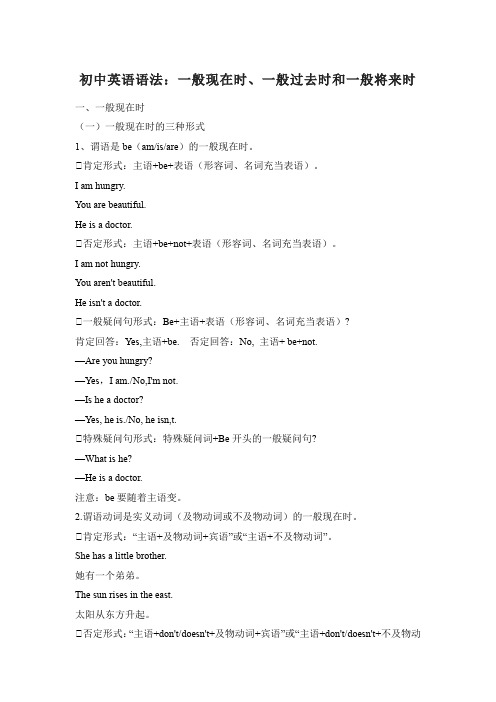
初中英语语法:一般现在时、一般过去时和一般将来时一、一般现在时(一)一般现在时的三种形式1、谓语是be(am/is/are)的一般现在时。
①肯定形式:主语+be+表语(形容词、名词充当表语)。
I am hungry.You are beautiful.He is a doctor.①否定形式:主语+be+not+表语(形容词、名词充当表语)。
I am not hungry.You aren't beautiful.He isn't a doctor.①一般疑问句形式:Be+主语+表语(形容词、名词充当表语)?肯定回答:Yes,主语+be. 否定回答:No, 主语+ be+not.—Are you hungry?—Yes,I am./No,I'm not.—Is he a doctor?—Yes, he is./No, he isn,t.①特殊疑问句形式:特殊疑问词+Be开头的一般疑问句?—What is he?—He is a doctor.注意:be要随着主语变。
2.谓语动词是实义动词(及物动词或不及物动词)的一般现在时。
①肯定形式:“主语+及物动词+宾语”或“主语+不及物动词”。
She has a little brother.她有一个弟弟。
The sun rises in the east.太阳从东方升起。
①否定形式:“主语+don't/doesn't+及物动词+宾语”或“主语+don't/doesn't+不及物动词”。
She doesn't have a little brother.她没有弟弟。
I don't eat every morning.我每天早晨都不吃饭。
①一般疑问句形式:“Do/Does+主语+及物动词原形+宾语”或“Do/Does+主语+不及物动词原形”。
肯定回答:Yes,主语+do/does. 否定回答是:No, 主语+ don't/doesn't.—Do you eat every morning?—Yes, I do./No, I don't.—Does she have a little brother?—Yes, she does./No, she doesn't.①特殊疑问句:特殊疑问词+do/does开头的一般疑问句?What do you like?When do you go to school?注意:根据主语确定用do还是does。
一般过去时一般现在时一般将来时ppt(共22张PPT)

watches
5. 5. Does he usually has a party?
have
6. 6. What do they on Sunday?
7. 7. Tony goes alwadyos oton sScuhnodoayl at eight o’clock.
Some day people will not go to the moon .
一般疑问句:把will 提到句子主语之前,结尾变问号。
Will Some day people go to the moon ?
didn’t do
_________ you ______ at the bus stop at 10:30?
pabelmangog6→ionipgn.lgatoDn+tnoe动Dad 词vo原i形dyohuaws aatgcohaTl.V(ev改er为y 一da般y?疑问句)
7. WDeoheasvDeafvoiudrhlaesvseoansg.o(al否? 定句)
yesterday yesterday morning (afternoon, evening…)
last night (week, month, year…) two days ago, a week ago, three years ago… in 1990, (in 1998…)
变化规则
一般在词尾加—ed
We don’t have four lessons.
对下列句子划线部分提问:
1. I get up at six o’clock.
一般现在时、一般过去时、一般将来时 讲义和练习

一般现在时、一般过去时、一般将来时讲义和练习一、一般现在时1.概念:经常、反复发生的动作或行为,现在的某种状况,表示普遍真理或客观事实2.时间状语: Always, usually, often, sometimes, every week (day, year, month…), once a week(day, year, month…), on Sundays,3.基本结构:主语 + 动词原形+其他(如主语为第三人称单数,动词上要改为第三人称单数形式)4.否定形式:主语+am/is/are +not+其他; 此时态的谓语动词若为行为动词,则在其前加don't, 如主语为第三人称单数,则用doesn't,同时还原行为动词。
5.一般疑问句:把be动词放于句首;用助动词do提问,如主语为第三人称单数,则用does,同时,还原行为动词。
二、一般过去时1.概念:过去某个时间里发生的动作或状态;过去习惯性、经常性的动作、行为。
2.时间状语:ago, yesterday, the day before yesterday, last week,last(year, night, month…), in 1989, just now, at the age of 5, one day, long long ago, once upon a time, etc.3.基本结构:主语+be动词过去式;主语+行为动词的过去式4.否定形式:主语+was/were +not+其他;在行为动词前加didn't,同时还原行为动词。
5.一般疑问句:was或were放于句首;用助动词do的过去式did 提问,同时还原行为动词。
6.例句:She often came to help us in those days.I didn't know you were so busy.三、现在进行时1.概念:表示现阶段或说话时正在进行的动作及行为。
- 1、下载文档前请自行甄别文档内容的完整性,平台不提供额外的编辑、内容补充、找答案等附加服务。
- 2、"仅部分预览"的文档,不可在线预览部分如存在完整性等问题,可反馈申请退款(可完整预览的文档不适用该条件!)。
- 3、如文档侵犯您的权益,请联系客服反馈,我们会尽快为您处理(人工客服工作时间:9:00-18:30)。
这是一般过去时哦, 这是一般过去时哦,请问谁 可以告诉我, 可以告诉我,什么叫做一般 过去时呢? 过去时呢?
一般过去时
• 为二级学习中的重中之重。 Strucre was/were 动词 相应的动 词过去式
实义动词
The most important point: 动词的过去 式是如何变化的? 式是如何变化的?
sing songs Did she __________(唱歌)? Yes ,she did .
climb a hill Did he __________(爬山)? Yes ,he did .
Did they watch TV? they Yes ,______ did.
Did _____she wash the clothes? Yes ,she did .
• A 规则变化 1 直接在动词后面加 "ed" please give some examples: ( ) ( )( ) 2 在以"e"结尾的动词后直接加"d" please give some examples: ( )( )( )
The most important point: 动词的过去式 是如何变化的? 是如何变化的?
What is he doing now?
He is running.
What is she doing now?
b
She is reading.
What are the boys doing?
They are fishing.
下面有谁来告诉我, 下面有谁来告诉我,以 上的句子是什么时候用 的呢? 的呢?它们有一个专有 名字,叫做什么呀? 名字,叫做什么呀?
动词的不规则变化请参照每一天 的考级单词中的动词部分。 的考级单词中的动词部分。
__ _______ (1)Where did you work at yesterday? I worked at the farm at yesterday. (2)What ___you talk with your mum at last night? did ________ We talked about my friend at last night. (3)Where did you live at three years old? I _____in my grandma’s house. lived ask (4)What ____ you ____ to teacher on last Monday? did I asked to her about the English.
观察一下几个句子
• He usually _____up at 17:00.(get ) 他通 常会在早上七点钟起床。 常会在早上七点钟起床。 • She often________( talk) about that book. 她经常谈起那本书。 • ___your sister ____( get) up early every morning? 你妹妹每天早上通常会多少点钟 起床? 起床?
Who will be the NO.1?
• Please finish these sentences as quickly as you can. Look! The twins_____their mother do the housework. (A) are wanting (B)help (C)are helping (D)are looking • The boy is ____to his teacher. • (A). saying (B). speaking (C). talking
Yes ,she did/No,she didn’t Yes,they did./No ,they didn’t.
结论: 提问句首前 动词还原为原形; 提问句首前, 结论:did提问句首前,动词还原为原形; 没有人称数变化, 用来作否定。 没有人称数变化,didn’t用来作否定。 用来作否定
What they last night
3 在以辅音 +y结尾的动词后,先把"y"变成"i", 再加 "ed". TIPS:please memorize, 辅音都有哪些?
Examples: carry cry
carried cried
Let's talk about" play "
The most important point: 动词的过去式是如 何变化的? 何变化的? 4 以一个元音+ 一个辅音结尾的动词,先双 写这个辅音字母,再加"ed". Could you give some examples?
Who will be the NO.1?
• Please finish these sentences as quickly as you can. • ⒈He _____(visit) the Great Wall last year. • 2.We________(have) a good time yesterday. • 3.We often _______(go) to school by bus last year.
让我们回忆一下,怎么在实义动词 后加"s"或"es"呢?
请大家观察这几个句子:
I often go to school by bus. She plays the piano every week. Zhang Ming always finishes his homework before 7 p.m.
谨记: 一般过去时表态; 疑问句要把did带; 谨记: 一般过去时表态; 疑问句要把 带 有did,动词还原; 没did,动词变过去式。 ,动词还原; ,动词变过去式。
过去式的一般疑问句
Did he listen to this music? Did you see a lot of animals? Did she cook for mum? Did they go to shool? Yes,he did /No,he didn’t Yes ,I did /No,I didn’t
观察句子,你发现了什么? 观察句子,你发现了什么? • I saw him ten minutes ago. • 十分钟前我看见了他。 十分钟前我看见了他。 • Last Sunday , I went to the America. • 上个星期天我去了美国。 上个星期天我去了美国。
谁能够说出这是什么时态? • 有标志词:有表示过去一段时 间的词,For example: yesterday, last year, last week, this morning, last Monday and so on.
He is do his homework. He is doing his homework. for example Look! He is playing basketball. Listen! Someone is singing in the music room.
Let’s do them!
Day One
What did you do in your summer holiday?暑假的时候你做了什么呀?
What did he/she/they /it do yesterday?
What did he/she/they /it do yesterday?
观察句子,你发现了什么? • I wrote a letter to him last month. • 我上个月写了信给他。 我上个月写了信给他。 • I bought this car last year. • 去年我买了这一辆车。 去年我买了这一辆车。 • He came to see me this morning . • 他早上来看我了。 他早上来看我了。
小贴 一般现在时表示经常性 反复性的 经常性、 一般现在时表示经常性、反复性的 士:
动作时 动作时,通常与 often,always, sometimes,every等 表示频率的词连用。 表示频率的词连用。
Look and make sentences. often
always
usually
never sometimes
通常在星期二有音乐课。 Tom 通常在星期二有音乐课。
他们通常会在周六打篮球。
下面有谁告诉我, 下面有谁告诉我,那叫 什么时态呀? 什么时态呀?
一般现在时
be 动词(is/am/are)+ 动词( 名词/形容词 名词 形容词 实意动词
主语 + 谓语
NO.1
表示一个 现在的事实或 者状态。 者状态。
He is a teacher . 他是一位老师
she is very beautiful.
No.2 表示重复规律、反复进行的行 为。当主语是单数第三人称时,谓 语的实义动词要加"s"或“es" For example I watch TV in the evening. They go to school every day. He watches TV in the evening. Bob goes to school every day.
• 现在进行时 • 结构 •
此结构表示动作在此刻或现阶段正 在进行之中,be动词要随着人称的 在进行之中,be动词要随着人称的 变化而变化。 变化而变化。 am 主语+ 主语+be is are
( + V.-ing(现在 分词) 分词)
Now, look at these sentence and tell which sentence is ture.
